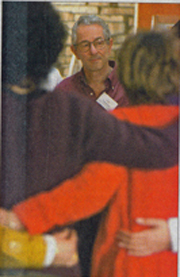Radicals on both sides in the conflicts have a connection — their hatred and willingness to kill for a cause, said Michael Ravly, an Israeli who works for Peace Camp Canada.
"But those in the middle — those who want peace — haven't been as good at helping one another," Bavly said. "Bringing people who are in the middle together for a weekend like this is empowering."
Titled "An Assimilation Weekend: North American Camps for the Middle East Peace Process," the event began Friday and ran through Monday at the Fetzer Institute. Participants included camp directors from Ontario and British Columbia in Canada, as well as from Texas. Washington, Utah, Colorado, California, New Mexico and Georgia.
"We have brought together people who are doing similar work but may not know about one another," said Len Traubman, coordinator of the event.
"In this work, nothing beats face-to-face relationships," Traubman said. "Once you make heart contact, you begin to see the other as human and want the best for them, just as you want for yourself."
Traubman and his wife, Libby, are founders of a California-based program that develops dialogues in various settings between Jews and Palestinians. "We believe that an enemy is only a person whose story you haven't heard," Libby Traubman said.
Every summer: hundreds of youths from the Middle East, along with Christian, Jewish and Muslim young people from North America, attend one of the dozen or so peace camps represented at the four-day gathering at the Fetzer Institute.
"I always thought that peace wouldn't happen in my lifetime. Now I think it might be right around the corner," said Maha Husseini. a Kids4Peace supporter who lives in Jerusalem. "I want to thank the Fetzer Institute for having us here."
The institute was founded by the late John Fetzer with the goal of focusing on various ways to bring health and healing to the world.
"Part of our work has drawn us to. if we can, bring the healing power of love into situations largely dominated by fear." said Thomas Beech, president and CEO of the Fetzer Institute.
"The work that they (peace-camp workers) do is a graphic example of how to build relationships and to build trust so that we can whittle away at the fear."

Len Traubman is among those participating in a group hug
Monday, ending a weekend
retreat that brought together
leaders of youth camps that
promote healing between
Jews, Muslims, and Christians.